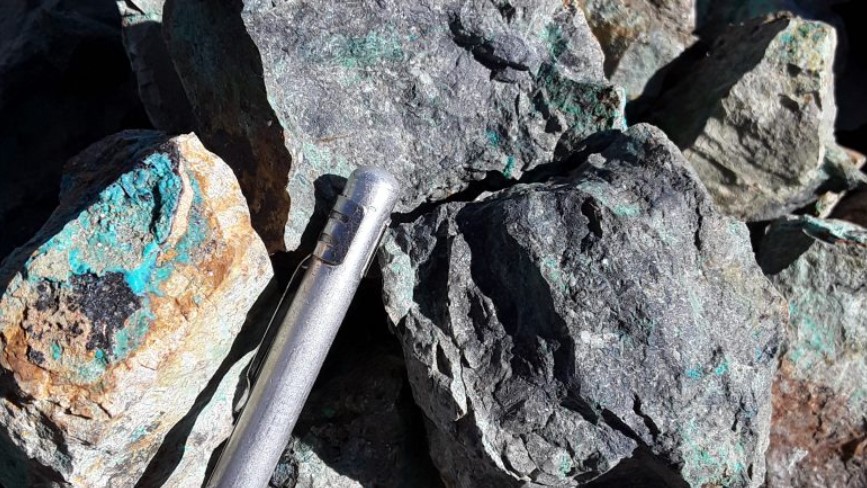JV Article: Golden Arrow Resources ready to start drilling at Rosales in Chile


Golden Arrow Resources (TSXV: GRG; US-OTC: GARWF) is a precious and base metal explorer with a pipeline of projects in Argentina, Chile, and Paraguay. It is part of the Grosso Group of companies, which has been working successfully in Argentina for almost three decades.
The Vancouver-headquartered junior is advancing its 100%-owned Rosales copper project in the Atacama region of Chile, approximately 90 km north of the city of Copiapo.
Brian McEwen, the Canadian junior’s vice president of exploration and development, says the company had been looking to acquire projects in Chile for some time as “it is a mature mining jurisdiction that we believe offers undervalued projects with significant upside potential and low development costs.”
“With copper prices rising, we felt that Rosales offered the best potential for value creation as it hosts both high-grade copper as well as additional metals. The project also benefits from world-class exploration and mining infrastructure.”
The Atacama region of Chile is a prolific mining area that hosts multiple precious and base metal deposits, including the Candelaria Copper Mining Complex, an 80:20 joint venture between Lundin Mining (TSX: LUN) and Sumitomo Corporation and comprises the Candelaria and Ojos del Salado copper mines, which produce copper concentrates from open-pit and underground mining operations.
Golden Arrow acquired Rosales in July 2020. The project covers 3,444 hectares of mineral claims held solely by Golden Arrow, with an additional 900 hectares of concessions adjacent to the project’s southern border currently under application by the company.
The project comprises several priority target areas characterised by near-surface copper stockwork and disseminated mineralisation that are potentially related to larger mineralised systems at depth.
Last year, a reconnaissance program on the property identified two areas of prospective mineralisation: the Margarita Mine trend (MMT) and the NW target.
The MMT is a 3.5-km-long structural corridor oriented northeast–southwest that hosts the Margarita copper mine, a small operation run by a local Chilean family.
Surface sampling of mineralised occurrences along the corridor returned values of between 0.37% copper and 4.37% copper (averaging 2.53% copper) from five rock chip samples.
About 2.7 km northwest of MMT, the NW target includes an outcrop with veinlets and fractures hosting quartz-chalcocite-copper oxides. Eight chip samples collected from the area averaged 3.19% copper and 13.9 grams silver per tonne. The sampling program also identified four other mineralised showings, with six samples returning values ranging from 1.42% copper to 4.66% copper.
In April, a Transient Electromagnetic (TEM) geophysical survey of the property identified several anomalies. Based on size, conductivity, and correlation with high-copper values in surface rock-chip samples, the highest priority anomaly, named G1, covered an area of 850 metres by 500 metres. The anomaly included several conductive zones, with its shallowest part estimated to be at approximately 100 metres below surface.
Transient Electromagnetic (TEM) survey equipment being taken to an area where several flat layers with high conductivity had been detected at Golden Arrow Resources’ Rosales copper project in Chile. Credit: Golden Arrow Resources
A second conductive anomaly, G2, about 500 metres to the southeast of G1, covered 600 metres by 400 metres and remains open to the south. Its upper reaches are estimated to be within 100 metres of surface, with its depth extent still to be determined.
A third conductive target, about 2.7 km northwest of G1, was also identified.
The TEM survey “performed much better than we expected and identified significant areas with near-surface anomalies that have the potential to host substantial copper sulphide mineralisation,” said McEwen.
Following the success of the initial survey, Golden Arrow conducted an additional TEM survey across G1 and G2. The survey identified another, more significant anomaly below G1 and G2. Reaching approximately 500 metres below surface, the new anomaly included sub-vertical zones of increased conductivity connecting the near-surface and deeper features.
In addition to the TEM surveys, the company has also completed a 5,035-hectare ground-based magnetic survey. Initial interpretation of the survey data indicated zones of low magnetism coincident with the TEM conductivity anomalies.
According to McEwen, the survey results suggest a stratabound or mantos-style high-grade copper deposit. “This type of deposit is common in Chile, with well-known examples including the El Soldado [operated by Anglo American] and Mantos Blanco [owned by Mantos Copper] mines. Our priority is now to drill test these targets.”
The company plans to conduct an initial 3,000-metre phased reverse circulation drill program to test the identified targets, and is expected to start at the beginning of September. For the first phase, four holes (1,400 metres) will be drilled to primarily test shallow targets, with one hole drilled up to 800 metres to test deeper targets. The subsequent 1,600 metres of drilling will test the extent of the anomalies as well as other targets.
Golden Arrow currently has about $18 million in the treasury, which “will be more than sufficient to fund our current work program,” said McEwen.
The company is also looking to advance its other assets in South America. In Argentina, these include the Flecha de Oro gold project; the Caballos, Don Bosco, and Mogote copper-gold projects; the Potrerillos gold-silver project; and the Yanso gold project. It also owns Tierra Dorada, a district-scale gold project in Paraguay.
The preceding Joint-Venture Article is PROMOTED CONTENT sponsored by GOLDEN ARROW RESOURCES and produced in cooperation with Canadian Mining Journal. Visit www.goldenarrowresources.com for more information.
Comments